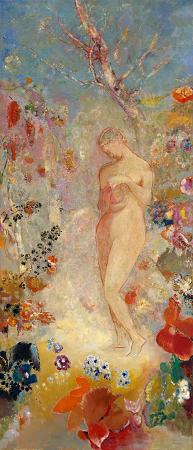Pandora. In Greek mythology, Pandora was the first human woman created by Hephaestus on the instructions of Zeus. As Hesiod related it, each god co-operated by giving her unique gifts. Her other name, inscribed against her figure on a white-ground kylix in the British Museum, is Anesidora, she who sends up gifts. The Pandora myth is a kind of theodicy, addressing the question of why there is evil in the world. According to this, Pandora opened a jar, in modern accounts sometimes mistranslated as Pandora's box, releasing all the evils of humanity. Hesiod's interpretation of Pandora's story, sometimes considered as misogynous, went on to influence both Jewish and Christian theology and so perpetuated her bad reputation into the Renaissance. Later poets, dramatists, painters and sculptors made her their subject and over the course of five centuries contributed new insights into her motives and significance. Hesiod, both in his Theogony and in Works and Days, gives the earliest version of the Pandora story. The Pandora myth first appeared in lines 560-612 of Hesiod's poem in epic meter, the Theogony, without ever giving the woman a name. After humans received the stolen gift of fire from Prometheus, an angry Zeus decides to give humanity a punishing gift to compensate for the boon they had been given. He commands Hephaestus to mold from earth the first woman, a beautiful evil whose descendants would torment the human race. After Hephaestus does so, Athena dresses her in a silvery gown, an embroidered veil, garlands and an ornate crown of silver. This woman goes unnamed in the Theogony, but is presumably Pandora, whose myth Hesiod revisited in Works and Days. When she first appears before gods and mortals, wonder seized them as they looked upon her. But she was sheer guile, not to be withstood by men. Hesiod elaborates: From her is the race of women and female kind: of her is the deadly race and tribe of women who live amongst mortal men to their great trouble, no helpmates in hateful poverty, but only in wealth. Hesiod goes on to lament that men who try to avoid the evil of women by avoiding marriage will fare no better: He reaches deadly old age without anyone to tend his years, and though he at least has no lack of livelihood while he lives, yet, when he is dead, his kinsfolk divide his possessions amongst them. Hesiod concedes that occasionally a man finds a good wife, but still evil contends with good. The more famous version of the Pandora myth comes from another of Hesiod's poems, Works and Days. In this version of the myth, Hesiod expands upon her origin, and moreover widens the scope of the misery she inflicts on humanity. As before, she is created by Hephaestus, but now more gods contribute to her completion: Athena taught her needlework and weaving; Aphrodite shed grace upon her head and cruel longing and cares that weary the limbs; Hermes gave her a shameful mind and deceitful nature; Hermes also gave her the power of speech, putting in her lies and crafty words; Athena then clothed her; next Persuasion and the Charites adorned her with necklaces and other finery; the Horae adorned her with a garland crown. Finally, Hermes gives this woman a name: Pandora-All-gifted-because all the Olympians gave her a gift. In this retelling of her story, Pandora's deceitful feminine nature becomes the least of humanity's worries. For she brings with her a jar containing burdensome toil and sickness that brings death to men, diseases and a myriad other pains. Prometheus had warned his brother Epimetheus not to accept any gifts from Zeus. But Epimetheus did not listen; he accepted Pandora, who promptly scattered the contents of her jar. As a result, Hesiod tells us, the earth and sea are full of evils. One item, however, did not escape the jar: Only Hope was left within her unbreakable house, she remained under the lip of the jar, and did not fly away. Before, Pandora replaced the lid of the jar. This was the will of aegis-bearing Zeus the Cloudgatherer. Hesiod does not say why hope remained in the jar. and closes with the moral: Thus it is not possible to escape the mind of Zeus. Hesiod also outlines how the end of man's Golden Age was brought on by Prometheus. When he stole Fire from Mt. Olympus and gave it to mortal man, Zeus punished the technologically advanced society by creating a woman. Thus, Pandora was created and given the jar which releases all evils upon man. Archaic and Classic Greek literature seem to make little further mention of Pandora, but mythographers later filled in minor details or added postscripts to Hesiod's account.
more...













